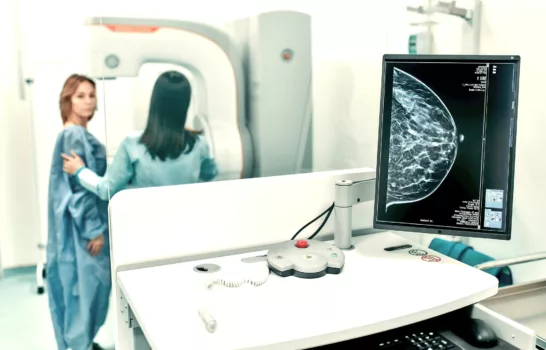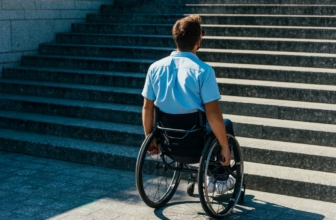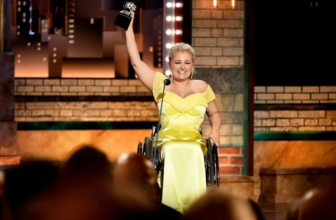Inaccessible diagnostic medical equipment such as exam tables, mammogram machines, X-rays, and MRIs can cost lives. Disabled people are not expendable and deserve the human dignity to have access to diagnostic care like anyone else, regardless of body mobility or size.
I went to my annual mammogram last year. Since my previous mammogram a year earlier, I have become unable to stand for any significant period of time. I was going to need to sit during my mammogram. I knew right away this was not going to go over well with the technician.
They came to get me from the changing room. Already I was upset since they did not have a robe that properly fit me. I had to walk down the hallway with a robe that kept opening while I tried to navigate my walker. I walked into the exam room and I immediately saw a bench chair. I explained to the technician that I would need to sit during my exam. She said, “No, you are going to have to stand.” I explained that I cannot stand for really any period, I have severe back pain. “You cannot stand for five minutes?” she asked. I said no. She said, “The only way I can get the images is for you to stand, so you are going to have to stand.”
I stood for the mammogram. She said, “See, that was not too bad.” I asked her what she does for someone in a wheelchair. She nodded and said, “We do our best.”
Granted, it was not all her fault. The manufacturer of the machine did not make it accessible and medical systems are not insisting on equipment that is accessible. It would seem that they do not care and that we are expendable.
Breast cancer runs in my family. I need annual mammograms. Having to stand for my mammogram could cause me to not want to go this year, putting me at risk of missing early signs of cancer.
This encounter is not isolated for me. I have had so many run-ins with inaccessible healthcare providers, offices, and equipment. There is hardly ever a blood pressure cuff that fits my arms, but knowing the wrong cuff gives inaccurate readings, they use them anyway. My hospital system has no open MRIs, forcing me to find one outside my hospital system at a greater cost). Exam tables in doctors' offices are too high, too narrow, and not sturdy enough. There are often no chairs in the doctor’s office that are wide enough or sturdy enough or have arms for comfort and safety, I took an ambulance ride and they did not know how to get me off the floor where I had fallen; I had to get myself up. The list goes on.
United States Rep. Ayanna Pressley is pushing for rules that would require diagnostic equipment to be accessible. “Pressley urged the department to quickly finalize its proposed rule to improve access to medical diagnostic equipment (MDE) for disabled people. MDE includes weight scales, examination tables, dental chairs, radiology devices, and other equipment that can be used to diagnose a patient.” These rules are past due. It's been 34 years since the ADA was passed and we still don't have parity in healthcare.
Some of the changes that need to happen are simple, straightforward, and not expensive. Others take manufacturers making this equipment available for purchase. Where there is a will, action can happen and make these changes possible. Specific standards at the Justice Department would need to be enacted to make these changes mandatory.
It is ridiculous that these changes cannot be automatic without forced compliance. Doctors and medical professional systems should advocate for their patients, all their patients — no matter their disability or ability. It is the right thing to do.
I am Black, lesbian, disabled, mentally ill, fat, a birth mom, mom and grandmom (grand ma Coco to be exact) and Funny. I am a woman who is constantly fighting for my and your liberation.
I have a history of working for those living at the margins mostly in activist and nonprofit spaces. I currently work in the mental health field serving those who have been convicted of felonies and are in mental heath court. I am also a writer. I write about disabilities, chronic illness, mental health, racial trauma, sexual violence and disordered eating. I am also a public community speaker on the same topics. Hit me up if you need my writing or speaking skills.
Please use she or her pronouns when referring to or about me.








